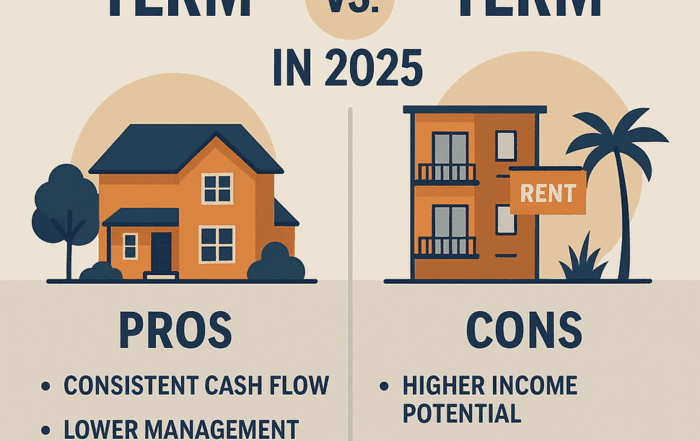
Renting ADUs and Main Houses in Florida
Accessory Dwelling Units (ADUs) have become an increasingly popular strategy for real estate investors looking to maximize rental income. With rising property values and high demand for rental units, ADUs offer an excellent way to increase cash flow. In Hillsborough County, zoning regulations are gradually evolving, allowing more property owners to build and utilize these secondary units. However, while the legal framework is changing, zoning laws still impose restrictions on renting both the main house and the ADU separately.
So, what do savvy investors do in practical terms to make this work while minimizing risks? Below, we’ll explore some of the most creative, real-world strategies investors are using right now. Plus, we’ll break down Hillsborough County’s evolving ADU regulations and what happens if authorities flag your rental setup.
Creative Ways Investors Rent Out ADUs & the Main House
Many investors find ways to rent out both their main home and ADU without violating zoning laws. These methods vary in risk levels, but all offer creative approaches to maximizing rental income while staying compliant.
1. Renting Under One Lease Agreement
Instead of leasing the main home and ADU separately, investors rent the entire property to a single tenant, who then has the option to sublease the ADU.
✅ Why it works: This method follows a legal lease agreement with one primary tenant, reducing the risk of direct zoning violations.
❌ Risk: If county officials investigate and determine that the ADU is functioning as a separate rental, they may enforce zoning laws and issue penalties.
2. Keeping It Off the Radar
Some investors avoid listing ADUs separately on platforms like Zillow or Realtor.com and instead rely on word-of-mouth, local networking, or private agreements.
✅ Why it works: It reduces public visibility and the risk of triggering zoning enforcement actions.
❌ Risk: If a neighbor reports the setup or if local officials notice multiple tenants at the property, an inspection may follow.
3. Using a Land Trust or LLC
Transferring the property into a land trust or LLC and leasing both units under the entity can create a legal distinction between the owner and rental activities.
✅ Why it works: Provides a layer of separation between the owner and the leasing structure, making it harder to track as an individual rental activity.
❌ Risk: Zoning laws still apply, and authorities may determine that this setup is an attempt to bypass regulations.
4. Classifying the ADU as a ‘Guest Suite’
Instead of marketing the ADU as a separate rental, some investors refer to it as a guesthouse or an extended family residence while collecting rent informally.
✅ Why it works: Since ADUs are allowed for family or guest use, this keeps the setup off official rental records.
❌ Risk: If a tenant requests separate mail service or changes their address, it could alert officials that the ADU is functioning as an independent rental.
5. Owner-Occupied ‘House Hacking’
One of the safest and most compliant methods is for the owner to live in one unit while renting out the other.
✅ Why it works: This approach aligns with ADU zoning laws and is legally permitted in many jurisdictions.
❌ Risk: The owner must reside on-site, which limits flexibility for investors who prefer to rent both units fully.
6. Renting to ‘Housemates’ Instead of Tenants
Rather than treating the ADU as a standalone rental, some investors establish shared living spaces, such as common backyards or laundry areas, creating a co-living arrangement.
✅ Why it works: Reduces the appearance of two separate rental units while still allowing for rent collection.
❌ Risk: If utilities or addresses are separated, authorities may view this as an illegal dual rental arrangement.
Hillsborough County’s ADU Rules Are Evolving
Hillsborough County has taken progressive steps to ease restrictions on ADUs, responding to increasing housing demand. Some recent updates include:
-
Expanding permitted ADU areas within Tampa and surrounding neighborhoods.
-
Relaxing owner-occupancy requirements in some zones, making it easier to rent out units.
-
Considering future policy changes that could further enhance rental flexibility.
While ADU laws remain restrictive in some areas, the trend is moving toward greater acceptance of multi-unit rentals.
Counties and Cities That Allow Renting Both the Main House and ADU
The ability to rent both a primary residence and its ADU simultaneously in Florida varies by county and municipality. While comprehensive data for all counties is limited, here are some examples:
1. Pinellas County
-
Allows both the primary home and ADU to be rented if designated for affordable housing.
-
Waives the owner-occupancy requirement under specific conditions.
2. City of Orlando
-
Permits renting both the main house and the ADU, provided zoning requirements are met.
-
Short-term rentals (less than 30 days) are generally restricted.
3. City of St. Petersburg
-
Allows separate rentals of the primary residence and ADU, subject to zoning and permitting requirements.
4. Walton County
-
Permits small ADUs (less than 800 sq. ft.) in all residential zoning districts.
-
Prohibits short-term vacation rentals for ADUs.
5. City of Hallandale Beach
-
Allows ADUs to be rented, but only to individuals earning no more than 50% of the Area Median Income (AMI).
-
Prohibits short-term rentals of ADUs.
6. Miami-Dade County
-
Permits ADUs in specific zoning districts but requires the owner to live in the principal dwelling unit if renting the ADU.
-
Prohibits ADUs from being used as independent vacation rentals.
Final Thoughts: The Reality of ADU Investing
My opinion is that the risk based on the fast changes is mid to low. Always do your research and contact local authorities. It is a similar risk as when you buy a property subject to the loan—everyone does it, but the bank can call it anytime. However, I have never seen it happen. Code violations are primarily in place to protect tenants, so if you take the risk, take care of them like family.
As ADU laws continue to evolve, the landscape for rental opportunities will likely become more favorable. Until then, investors must balance compliance, creativity, and risk management to make the most of this rental strategy.
Disclosure
This article is for entertainment and informational purposes only. We are not providing legal or financial advice, nor are we encouraging any specific action. Always consult a real estate zoning expert or lawyer before renting out an ADU and main home separately.
Written by CEO of Graystone & companies & Coach of the Property Profit Academy
Property Profit Academy
If you are not ready to start now, do not have the funds or the education… Let me guide you at https://www.propertyprofitacademy.com/ – Jorge Vazquez, CEO of Graystone Investment Group & its subsidiary companies and Coach at Property Profit Academy.
Pick your expert. Book your free 15-minute consult now. We are here to help!
Our Top Articles
Can Buying Real Estate in Florida Help You With Immigration?
Jorge Vazquez2025-07-07T18:54:31+00:00July 7th, 2025|Comments Off on Can Buying Real Estate in Florida Help You With Immigration?
Can Buying Real Estate in Florida Help You With Immigration? So you’re wondering, “If I buy a couple rental [...]
Long-Term vs. Short-Term Rentals in 2025: Which Strategy Wins?
Jorge Vazquez2025-07-07T03:10:20+00:00July 7th, 2025|Comments Off on Long-Term vs. Short-Term Rentals in 2025: Which Strategy Wins?
In 2025, the real estate world feels a little like a game show. Behind door one: long-term rentals—steady, reliable, [...]
What Does Cap Rate Mean in Real Estate (And Why I Actually Use It)
Jorge Vazquez2025-07-05T13:43:14+00:00July 5th, 2025|Comments Off on What Does Cap Rate Mean in Real Estate (And Why I Actually Use It)
What Does Cap Rate Mean in Real Estate (And Why I Actually Use It) Alright, I’m gonna break this [...]
Property Profit Academy:
✔ Learn to buy properties with little to no money down.
✔ Build a $10M portfolio step by step.
✔ Master strategies like BRRRR and house hacking.








